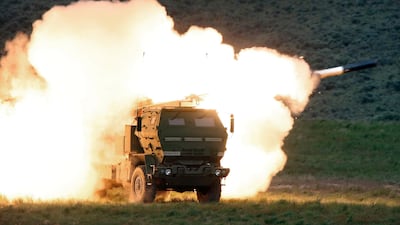US President Joe Biden announced on Wednesday a new $700 million weapons package for Ukraine that includes advanced rocket systems that can strike Russian forces from a distance of up to 80 kilometres.
And US Secretary of State Antony Blinken warned that the conflict will probably stretch on for many more months.
To avoid escalating the war, Washington announced the plan to give Ukraine precision Himars rocket systems after receiving assurances from Kyiv that it would not use them to hit targets inside Russian territory.
"The United States will stand with our Ukrainian partners and continue to provide Ukraine with weapons and equipment to defend itself," Mr Biden said.
A top Pentagon official said the US would initially send four Himars systems to Ukraine, noting it would take about three weeks to train Ukrainian forces to use them.
"No system is going to turn the war. This is a battle of national will … it is a grinding, hard conflict," said Colin Kahl, under secretary of defence for policy.
The Himars multiple-launch rocket system can fire several precision-guided missiles at once.
A western official described it as highly mobile and particularly effective at engaging targets then shifting location.
“It outperforms the other systems that Russia is fielding in the battle space," the official said.
"What it will mean is that weapon system will enable counter-battery fire to be able to go after Russian artillery in a deeper and more effective way.
"By having that reach of 80 kilometres, you can get into those Russian supply lines."
Mr Biden, who announced his decision to send the rockets to Ukraine in an opinion piece late on Tuesday, said the US would not support attacks inside Russia, which quickly warned of greater risks of conflict between Washington and Moscow.
But Mr Blinken dismissed suggestions that the US could be risking escalation with Russian President Vladimir Putin, who invaded Ukraine on February 24 despite repeated western warnings.
"It is Russia that is attacking Ukraine, not the other way around," he said alongside Nato Secretary General Jens Stoltenberg.
"Simply put, the best way to avoid escalation is for Russia to stop the aggression and the war that it started. It's fully within its power to do so."
Mr Blinken said the Pentagon was arming Ukraine in anticipation of a long conflict ahead.
"As best we can assess right now, we are still looking at many months of conflict," he said.
"As long as this goes on, we want to make sure that Ukraine has in hand what it needs to defend itself and we want to make sure that Russia is feeling strong pressure from as many countries as possible to end the aggression."
Meanwhile Danish voters went to the polls on Wednesday to decide whether to join the EU’s common defence policy.
Nordic neighbours Sweden and Finland have decided to apply for Nato membership, and many European countries are shoring up their defences to face up to a newly hostile Russia.
Mr Stoltenberg said he would convene senior officials from the three nations in Brussels in the coming days "to ensure that we make progress on the applications of Finland and Sweden to join Nato".
"My intention is to have this in place before the Nato summit" in Madrid starting on June 28, he said.
"Finland and Sweden have made it clear that they are ready to sit down and to address the concerns expressed by Turkey.
Mr Putin "wanted less Nato. He is getting more Nato", Mr Stoltenberg said.
All 30 Nato members must agree to admit a new member and Turkey has voiced objections, saying militants from the PKK, the Kurdish separatist group considered terrorists by Ankara, were in Finland and Sweden.
Mr Stoltenberg said that the two nations and Nato took the PKK issue "very seriously".
Meanwhile, Ukraine’s UN ambassador Sergiy Kyslytsya on Wednesday angrily rejected recent suggestions from Henry Kissinger, a geo-strategic consultant and former US secretary of state, that Kyiv should cede territory to end the war with Russia.
In an online session, Mr Kyslytsya condemned the “irresponsible drivel” from Mr Kissinger, who at last month’s World Economic Forum in Davos said Ukraine should let Russia keep Crimea, which it annexed in 2014.
“The Ukrainians … are so determined that no deals that involve permanent territorial concessions are supported by the public,” Mr Kyslytsya said.
"Any politician that will try to break such a deal with the Russians or whoever has no political future."
- Agencies contributed to this report.









































